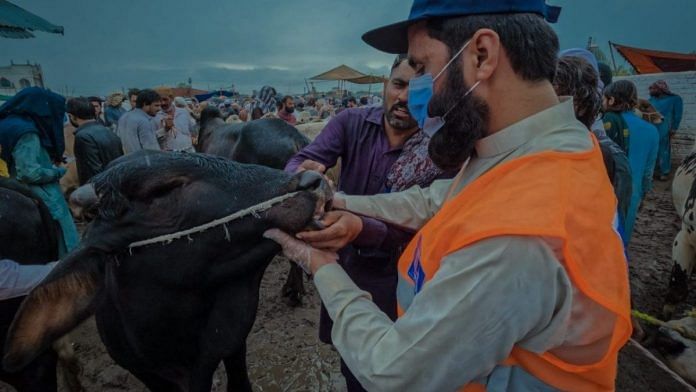New Delhi: Livestock in Pakistan have a problem with LSD. No, not the psychedelic drug but the viral skin disease characterised by raised nodules on the skin. Hence the name, lumpy skin disease or LSD. The country has been trying to curtail the spread of this contagious disease for several months now, but the situation has only become worse and is now all the more urgent ahead of Eid Ul Azha scheduled around 4-5 July.
As per media reports, the disease first emerged in Sindh province, where more than 570 cows have reportedly died so far, and has spread in the entire Punjab province. Small farmers — those who have about 50 livestock — are worried they will be the most impacted.
The livestock department in Punjab said there was no money to buy vaccines for cattle. Many small farmers are buying the vaccine from their own pockets, with a 100 ml bottle costing as much as Rs 44,000. The livestock department has pleaded to the government to release funds. In the absence of the vaccine, many are using anti-tick spray to prevent their cattle from contracting the disease. The vaccination takes 28 days to show effect, during which the cattle’s health remains uncertain.
Also read: In Pakistan, the cow has arrived. With it, comes Imran Khan’s new revolution
Threat before Eid
The disease outbreak is not only threatening to ruin Eid celebrations, but it is also likely to severely impact Pakistan’s livestock industry, which contributes 11 per cent to the country’s GDP. Pakistan’s economy is already suffering a financial crisis.
According to the Pakistan Economic Survey, livestock contributed almost 60 per cent to the agriculture industry in the financial year 2020-202. Almost eight million families in Pakistan work in the livestock industry. It is estimated that around five million dairy farmers will suffer. People have stopped buying milk, although it can be consumed if properly pasteurised. The disease, health experts in Pakistan have said, doesn’t transmit to humans by consuming milk from an infected animal.
This bacterial infection can cause cattle to produce less milk. The disease also hampers their reproductive system. In a survey carried out by Dawn newspaper, milk consumption dropped by 60-70 per cent in Karachi.
Also read: American bulls’ semen to improve Pakistan’s cow breeding & why this cleric’s a Salman Khan fan
Who is to blame?
Pakistan’s Dairy & Cattle Farmers Association (DCFA) has accused the administration of not providing any support to help farmers deal with the crisis.
Lumpy Skin Disease
آرگنائزر ڈی سی ایف اے بہاولپور عابد اقبال کی لمپی اسکن ڈیزیز کے حوالے سے تشویش pic.twitter.com/x7388kgVtY
— Dairy & Cattle Farmers Association (DCFA) Pakistan (@DCFAPakistan) June 25, 2022
Some have also blamed Indian cows, which might have crossed the border accidentally, for the spread of the disease in Pakistan. “Animals often cross borders and may have come from India where the disease was already present,” Dr Nazeer Hussain Kalhoro, director general of the Sindh Institute of Animal Health, told Dawn. India had witnessed an outbreak of LSD in bovines in 2021.
A Pakistani Twitter user posted recently that she was thinking of avoiding consuming red meat. Another user said at least 25 animals had died in his village and that there has been no vaccination drive.
As Pakistan’s Eid celebrations face the threat of LSD, the government has recommended people not to buy cattle products a couple of days before the festival. Pakistan needs a miracle moo to help the cattle, and those dependent on them.



